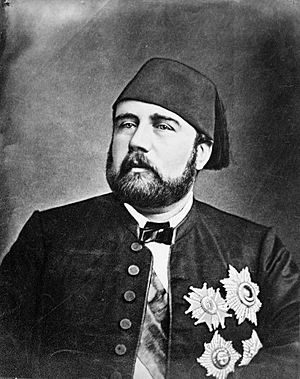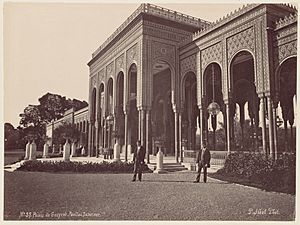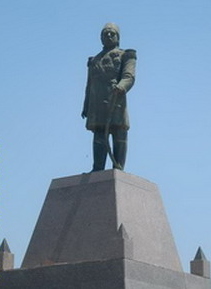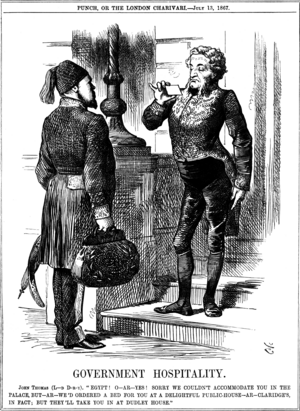Isma'il Pasha of Egypt facts for kids
Quick facts for kids Ismail PashaIsmā‘īl Bāshā إسماعيل باشا |
|
|---|---|
 |
|
| Khedive of Egypt and Sudan | |
| Reign | 19 January 1863 – 26 June 1879 |
| Predecessor | Sa'id I (as Wāli (unrecognized Khedive) of Egypt) |
| Successor | Tewfik I |
| Born | 12 January 1830 Cairo, Egypt Eyalet, Ottoman Empire |
| Died | 2 March 1895 (aged 65) Istanbul, Ottoman Empire |
| Burial | Al-Rifa'i Mosque, Cairo, Egypt |
| Spouse |
|
| Issue | Tewfik I of Egypt Hussein Kamel I of Egypt Fuad I of Egypt Prince Ali Jamal Princess Jamilah Fazail Hanim Princess Fatima Hanim Princess Amina Hanim Princess Nimetullah Hanim Princess Amina Aziza Hanim Princess Zainab Hanim Princess Tawhida Hanim |
| House | Alawiyya |
| Father | Ibrahim I |
| Mother | Hoshiyar Qadin |
| Religion | Sunni Islam |
Ismail Pasha (Arabic: إسماعيل باشا Ismā‘īl Bāshā; 12 January 1830 – 2 March 1895) was a very important ruler of Egypt and Sudan. He was known as the Khedive, which is like a viceroy or governor. He ruled from 1863 to 1879.
Ismail Pasha wanted to make Egypt and Sudan modern and strong, just like countries in Europe. He invested a lot in new industries, improving cities, and making the country's economy better. He also expanded Egypt's borders in Africa. He once said that his country was becoming part of Europe, and they should adopt new ways.
During his rule, he got the title of Khedive officially recognized by the Ottoman Empire. This was a higher title than "Wāli" (governor), which his family had used before. However, his big plans cost a lot of money. This led to Egypt getting into serious debt. Eventually, he had to sell Egypt's shares in the Suez Canal Company to the British government. This also led to him being removed from power in 1879. The city of Ismailia is named after him.
Contents
Ismail Pasha's Early Life and Family
Ismail Pasha was born in Cairo, Egypt, in 1830. He was the second of three sons of Ibrahim Pasha. His grandfather was Muhammad Ali Pasha, who was also a famous ruler. Ismail's family had Albanian roots. His mother, Hoshiyar Qadin, was from Circassia. She was also the sister of Pertevniyal Sultan, who was the mother of the Ottoman Emperor Abdulaziz. This means Ismail Pasha and Emperor Abdulaziz were cousins.
Ismail's Education and Early Career
Ismail Pasha received a good education in Paris, France. He studied at a military school there. After finishing his studies, he returned home. When his older brother passed away, Ismail became the heir to his uncle, Said I. Said was the ruler of Egypt and Sudan at the time.
His uncle Said often sent Ismail on important trips to other countries. He visited the Pope, Emperor Napoleon III of France, and the Sultan of the Ottoman Empire. In 1861, Ismail led an army of 18,000 soldiers to stop a rebellion in Sudan, which he successfully did.
Becoming Khedive of Egypt
After his uncle Said died, Ismail became the Khedive on January 19, 1863. At first, the Ottoman Empire and other powerful countries only recognized him as a "Wāli" (governor). But Ismail wanted the higher title of Khedive, just like his grandfather.
In 1867, Ismail finally convinced the Ottoman Sultan Abdülaziz to grant him the title of Khedive. He also changed the law so that the next ruler would be his son, not his brother. This made Egypt more independent from the Ottoman Empire.
Ismail Pasha's Modernization Projects
Ismail Pasha spent a lot of money on making Egypt modern. He used some of it to influence officials in Constantinople to support his plans. A large part of the money went towards building the Suez Canal.
He also built many other things:
- About 8,000 miles (12,875 km) of irrigation canals to improve farming.
- Over 900 miles (1,448 km) of railroads.
- 5,000 miles (8,047 km) of telegraph lines.
- 400 bridges.
- New harbors in Alexandria.
- 4,500 schools.
He also improved the customs system and the post office. He encouraged trade and started new industries like sugar and cotton. He built beautiful palaces and supported an opera house and a theater. Many Europeans came to work in Cairo, and he helped build a new part of the city that looked like Paris. Alexandria was also improved. Egypt and Sudan gained more railroads per square kilometer than almost any other country.
Education was very important to him. He increased the education budget by more than ten times. He expanded existing schools and created new technical and vocational schools. Students were sent to Europe to study, which helped create a group of educated leaders. A national library was also started in 1871.
One of his important achievements was creating an assembly of delegates in November 1866. This group was meant to give advice, but its members became very influential in government. Village leaders in the assembly gained more political and economic power.
Ismail also tried to reduce slave trading. He expanded Egypt's rule in Africa, taking over Darfur in 1874. However, his army was defeated when he tried to expand into Ethiopia.
War with Ethiopia
Ismail Pasha dreamed of expanding his empire across the entire Nile River and along the African coast of the Red Sea. He also heard rumors of rich resources in these areas. This led him to try and expand into Ethiopia, which was ruled by Emperor Yohannes IV.
In 1865, the Ottoman Empire gave Ismail control of the Ottoman Province of Habesh, which included the cities of Massawa and Suakin on the Red Sea. This province was next to Ethiopia. Ismail's forces expanded into Ethiopian territory. New projects, like large cotton farms, were started. In 1872, the city of Keren was taken over by Ismail's governor.
In October 1875, Ismail's army tried to take over the highlands of Hamasien, which belonged to the Ethiopian Emperor. They were defeated at the Battle of Gundat. In March 1876, Ismail's army tried again and suffered another big defeat at the Battle of Gura. Ismail's son, Hassan, was captured and only released after a large payment. This led to a long period of tension. Eventually, in 1884, a treaty returned Keren to Ethiopia. The Red Sea Province created by Ismail later became the country of Eritrea.
The Suez Canal and Growing Debts
Ismail Pasha's rule is closely linked to the building of the Suez Canal. He agreed to and oversaw Egypt's part in its construction. When he became ruler, he initially disagreed with some of the terms of the Suez Canal Company. The issue was settled by Napoleon III, who ordered Egypt to pay the company a large sum of money.
Ismail worked hard to impress foreign leaders and the public. In 1867, he visited Paris and London, where he met Queen Victoria. He visited Britain again in 1869. When the Canal finally opened, Ismail hosted a huge celebration, inviting important people from all over the world.

All these projects, especially the war with Ethiopia, left Egypt deeply in debt to European countries. These countries then used Egypt's debt to gain more control. One unpopular change was the new system of "mixed courts," where Europeans were judged by judges from their own countries, not by Egyptian courts.
Egypt's national debt grew from £3 million to over £100 million during Ismail's rule. He kept borrowing more money, which only made the debt worse. When he could no longer get loans, he sold Egypt's shares in the Suez Canal Company to the British government in 1875 for almost £4 million. This was the beginning of direct involvement by powerful European countries in Egypt and Sudan.
In 1875, the British government sent people to investigate Egypt's finances. They found a lot of waste and suggested that foreign powers needed to step in to fix the economy. This led to European countries taking control of most of Egypt's government finances. Ismail had to give up much of his personal wealth to the nation and accept a role as a constitutional ruler, with European ministers in his government.
It was ironic that Egypt tried to become independent from European control through these development plans. But with each new project, Egypt became more dependent on Europe.
Ismail Pasha's Somali Coast Territory
From the 1870s until 1884, Ismail Pasha's rule included the northern coast of Somalia, extending inland to Harrar. However, he later gave up this territory to Britain in 1884 because of Egypt's own problems.
Urabi Revolt and Exile
Many Egyptians were unhappy with European control over their country. They supported a military officer named Ahmed Urabi, who led a revolt. Ismail did not try hard to stop Urabi, hoping the revolt would free him from European control. He agreed to Urabi's demands to dissolve the government.
Britain and France were very concerned. In May 1879, they demanded that the British and French ministers be put back in power. Since Urabi largely controlled the country, Ismail could not agree. As a result, Britain and France pressured the Ottoman Sultan Abdülhamid II to remove Ismail Pasha from power. This happened on June 26, 1879. Ismail's oldest son, Tewfik Pasha, became the new ruler.
Ismail Pasha left Egypt and went to live in Italy. Later, in 1885, the Sultan allowed him to move to his palace in Emirgan, near Istanbul. He stayed there, mostly as a state prisoner, until he died in 1895. He was later buried in Cairo.
Language in Egypt During Ismail's Rule
Even though Arabic was the common language in Egypt, Ismail Pasha spoke Turkish best and could not speak Arabic. However, during his rule, the use of Arabic in government slowly increased. Before this, Turkish had been the main language of the ruling class for hundreds of years under Ottoman rule. In the years after Ismail, Arabic became even more common in the army and government, with Turkish only used for talking with the Ottoman Sultan.
Images for kids
See also
 In Spanish: Ismail Pachá para niños
In Spanish: Ismail Pachá para niños
 | Claudette Colvin |
 | Myrlie Evers-Williams |
 | Alberta Odell Jones |




